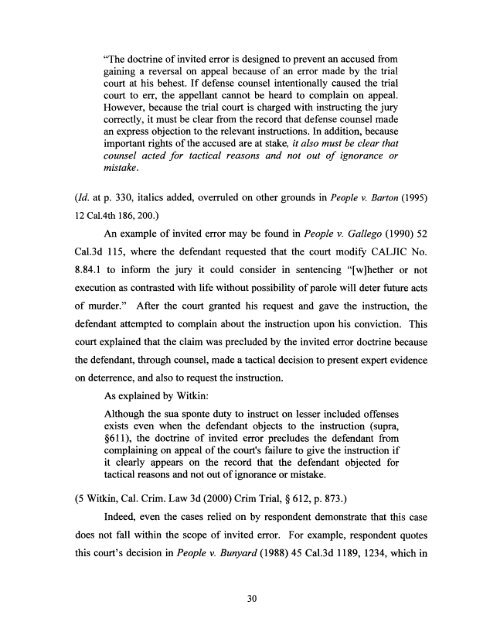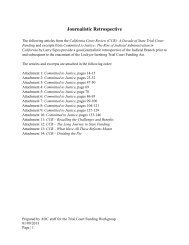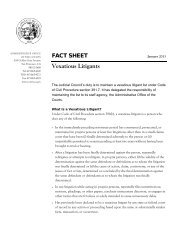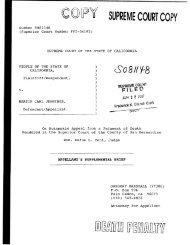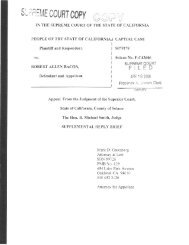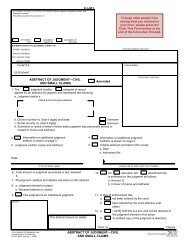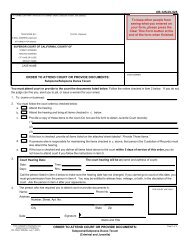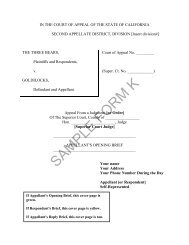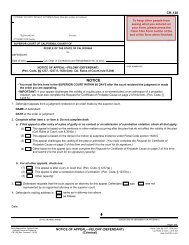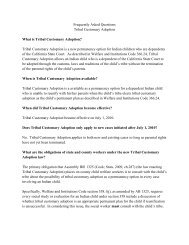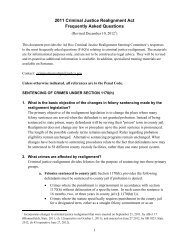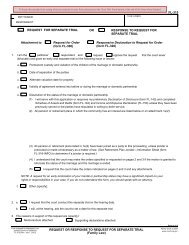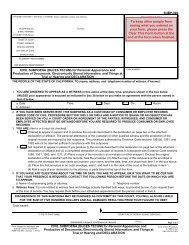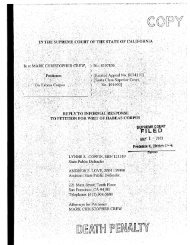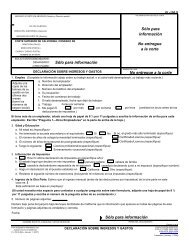Appellant, William Satele, Reply Brief - California Courts - State of ...
Appellant, William Satele, Reply Brief - California Courts - State of ...
Appellant, William Satele, Reply Brief - California Courts - State of ...
Create successful ePaper yourself
Turn your PDF publications into a flip-book with our unique Google optimized e-Paper software.
"The doctrine <strong>of</strong>invited error is designed to prevent an accused from<br />
gaining a reversal on appeal because <strong>of</strong> an error made by the trial<br />
court at his behest. If defense counsel intentionally caused the trial<br />
court to err, the appellant cannot be heard to complain on appeal.<br />
However, because the trial court is charged with instructing the jury<br />
correctly, it must be clear from the record that defense counsel made<br />
an express objection to the relevant instructions. In addition, because<br />
important rights <strong>of</strong>the accused are at stake, it also must be clear that<br />
counsel acted for tactical reasons and not out <strong>of</strong> ignorance or<br />
mistake.<br />
(Id. at p. 330, italics added, overruled on other grounds in People v. Barton (1995)<br />
12 Ca1.4th 186,200.)<br />
An example <strong>of</strong> invited error may be found in People v. Gallego (1990) 52<br />
Ca1.3d 115, where the defendant requested that the court modify CALJIC No.<br />
8.84.1 to inform the jury it could consider in sentencing "[w]hether or not<br />
execution as contrasted with life without possibility <strong>of</strong>parole will deter future acts<br />
<strong>of</strong> murder." After the court granted his request and gave the instruction, the<br />
defendant attempted to complain about the instruction upon his conviction. This<br />
court explained that the claim was precluded by the invited error doctrine because<br />
the defendant, through counsel, made a tactical decision to present expert evidence<br />
on deterrence, and also to request the instruction.<br />
As explained by Witkin:<br />
Although the sua sponte duty to instruct on lesser included <strong>of</strong>fenses<br />
exists even when the defendant objects to the instruction (supra,<br />
§611), the doctrine <strong>of</strong> invited error precludes the defendant from<br />
complaining on appeal <strong>of</strong> the court's failure to give the instruction if<br />
it clearly appears on the record that the defendant objected for<br />
tactical reasons and not out <strong>of</strong>ignorance or mistake.<br />
(5 Witkin, Cal. Crim. Law 3d (2000) Crim Trial, § 612, p. 873.)<br />
Indeed, even the cases relied on by respondent demonstrate that this case<br />
does not fall within the scope <strong>of</strong> invited error. For example, respondent quotes<br />
this court's decision in People v. Bunyard (1988) 45 Ca1.3d 1189, 1234, which in<br />
30


